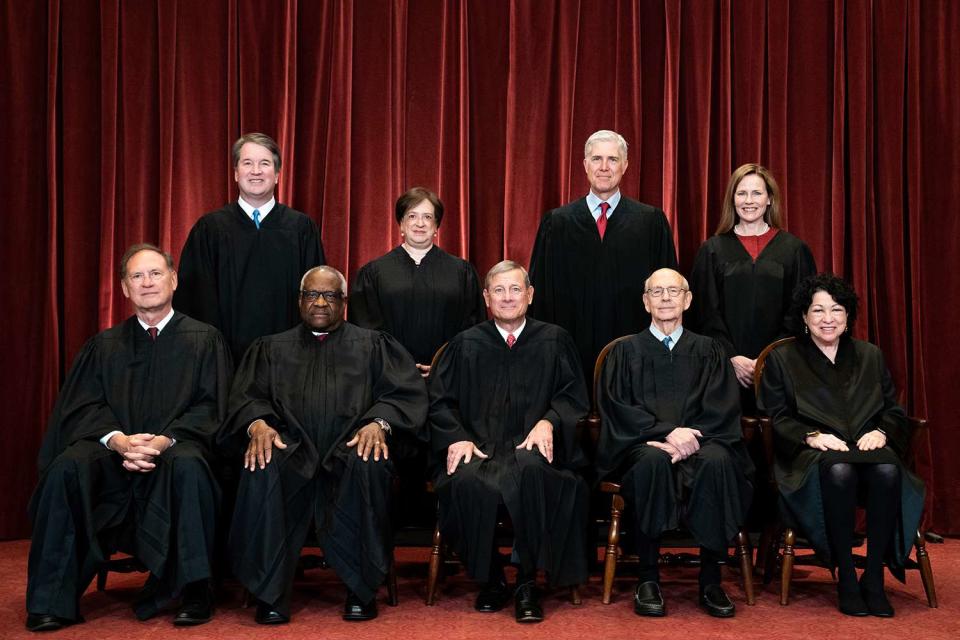Sonia Sotomayor on Wise Words That Helped When 'People Said I Wasn't Smart Enough' for Supreme Court

- Oops!Something went wrong.Please try again later.
Erin Schaff/AFP/ Getty Justice Sonia Sotomayor
Days before the Senate confirmed Ketanji Jackson Brown as the first Black woman on the Supreme Court, another judicial trailblazer spoke about the responsibility — and often the burden — of breaking down barriers in a polarized political climate.
"It isn't so easy," Justice Sonia Sotomayor told an audience of about 3,000 students, faculty and staff during an appearance at Washington University in St. Louis on Tuesday. "When I was being nominated, people said I wasn't smart enough to be on the Supreme Court. That hurt me … It felt like, 'What's enough, and when is it enough?' "
Sotomayor, 67, is the first Hispanic, first Latina and first woman of color (and only the third woman ever) to sit on the high court.
She was nominated by former President Barack Obama and has served since 2009.
Though she wasn't asked specifically about Jackson, who was then still two days away from her Senate vote, there are similarities in their experiences. And the lessons Sotomayor shared during the conversation in St. Louis on Tuesday went beyond the courtroom.
During her appearance at Washington University, Sotomayor — who has diabetes, putting her at higher risk for serious illness from COVID-19 — thanked the audience for wearing masks to help keep her safe before she stepped off the stage to mingle while answering questions from Chancellor Andrew D. Martin and students.
"The guys up here, the big guys with stuff around their waist and things, they're here to protect you from me," she quipped, referring to her security detail as she began circulating through the crowd. "I do things they don't like, including walking in the audience."
RELATED: In Rare Statement, Justices Sotomayor & Gorsuch Deny Report of Tension Over Masking
When the chancellor asked the justice about navigating "extreme political polarization" and divisive discourse, Sotomayor let out an intense sigh.
"It's never-ending now. There is a lot of screaming between people and among people. It's sometimes very hard to get past that din. It sort of gets into your head," she said.
One of three liberal-leaning justices on the bench with six judges nominated by conservative presidents, Sotomayor said she is guided by wisdom imparted by her late mother, Celina Báez Sotomayor.
"With my colleagues, with whom have very divergent views with many — probably the majority right now," she said, prompting laughter and applause, "I try very, very hard to see the good in them, because there's good in every one of them."

Erin Schaff-Pool/Getty Supreme Court justices
RELATED: Sonia Sotomayor's New Book Inspired by Her Late Mother: 'She Danced 'Til the Last Days of Her Life'
She said she also relies on advice she received from retired Justice David Souter, whom she succeeded in 2009: "When he realized all of his colleagues, particularly the ones he disagreed with, were people who believed as passionately as he did in the Constitution and our system of government and the laws of our country that it became easier for him to not get so angry at them, to let it go."
It turns out that Souter and Sotomayor's mother, who died of cancer in July 2021, were on the same page.
"I realized that is what my mother taught me, which is you're going to differ in views with people and some of the views are going to be or feel offensive to you," Sotomayor said. "Sensitive issues around racism can be very, very hard, particularly if you feel someone's attacking your integrity as a person or your work as a person."
The misgivings she mentioned about her intelligence and the questioning of her qualifications during her confirmation process "cut me to the quick," she said, despite "coming from Princeton with the honors I received there, going to Yale, doing fairly well, being a district court judge and a circuit court judge."
"The reality is, that for some people, you're a minority," she continued "They believe that affirmative action opened the door for you. They forget that you don't judge a person by who opens the door; you judge them by what they did when they went through the door."

The White House via Getty Images
RELATED: Justice Sonia Sotomayor Gives Advice to Gloria Estefan's Daughter Emily About the Next Generation
And therein lies the burden, Sotomayor explained. Even when someone has proved herself, vocal critics can remain. It can be "hurtful," she said.
"But," she added, "you can't write people off because of what they don't know." Instead, she implied, there's a responsibility that comes with blazing a trail like she, Jackson and others have done.
"You have to be part of what educates them," she said. "You have to be part of what talks with them and brings out from them the best in themselves in order for them to listen to your side of what you're trying to say."
"That for me is the best answer I can give, chancellor, of how you live in this polarized world," she continued, strolling down the aisle as masked students looked on.
"Stop screaming. Listen. Try to put yourself in the shoes of that other person," she said. "Try to figure out what it is they are feeling and the why of it. People, when they feel threatened, tend to lash back. And that sense of being threatened can stop them sometimes from being nice. And so you have to work into getting them to be a better part of themselves."

